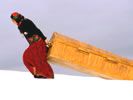Eye For Film >> Movies >> Half Moon (2006) Film Review
There can’t be many ‘let’s do the show right here’ movies that open with a quote from Kierkegaard and a cockfighting scene. But that’s just the first of many surprises in Ghobaldi’s award-winning comedy drama.
And it’s a testament to the film’s warmth and humanity that an opening gambit which would normally drive me screaming to the exit seems natural and uncliched. Quotes from philosophers often signal ‘ponderously striving for significance arthouse’. But here it’s bellowed through a megaphone by the cockfight’s MC to calm down a throng of gamblers tightly packed into a cellar in an unnamed Iranian border town. The quote is about the triumph of the human spirit over death, which is to be a key theme throughout the film.

Equally, the fight itself, which some directors (especially western ones) would use as a signifier for ‘Middle Eastern backwardness/brutality’ is depicted as a thing of ritual and ceremony, taking a struggle for survival and turning it into a brief respite from the spectators’ equally stark and demanding lives. The image of the MC’s young sons providing a beautiful musical accompaniment is a haunting image, illustrating the film’s other central theme; the power of music to transcend its setting, and offer innocence and hope amidst harshness and adversity.
Having created a brilliant opening scene, Ghobadi then stops it dead as the Kako, the MC (Allah-Morad Rashtiani) takes a mobile phone call from his old friend Mamo, a legendary Kurdish musician, asking him to help organise a trip to a concert in Iraqi Kurdistan to celebrate the fall of Saddam. Kako immediately drops everything and gets to work.
He hires a bus (sadly, not a London double-decker, but an equally characterful orange half-tank) and begins driving around the towns and villages of the Iran/Iraq/Turkey border area collecting Mamo’s backing group (which seems to consist mainly of his sons) before picking up the great man himself.
When we first meet Mamo (Ismail Ghaffari) it’s in a cemetery, with a host of green prayer flags providing the only colour in a mountainscape of arid browns. The man himself is as elemental as his setting; lean and weathered as an Old Testament prophet, in equal parts curmudgeonly, arrogant and passionate. It’s easy to see why he inspires loyalty and devotion, but equally easy to predict that any bus ride with him on board will never be a smooth one.
Sure enough, his first command is that they travel to a guarded village where the Iranian government has exiled 1334 female singers, forbidden to ply their trade in public. He wants to find the equally legendary Hesho (Hedye Tehrani), his former muse, and he’s not taking ‘no’ for an answer. The detour provides the film’s most glorious image, where the massed ranks of singers, spread out across the village rooftops, serenade Mamo’s arrival. But it also opens up a fairly sizeable can of worms, as Hesho will not be allowed to officially perform at the concert, or even to cross the border into Iraq.
They continue their journey, but it is dogged by bad omens and setbacks both light-hearted (Kako films the whole trip hoping to sell the video for a fortune, unaware that there’s no tape in it) and deadly serious (a border check led by an officious martinet of an Iranian officer, who plainly has no liking for Kurds or musicians).
Throughout, Ghobadi keeps the focus on character and plot, resisting the temptation to turn the film into a lush travelogue (though there are several striking shots of the high country and an almost palpable atmosphere of chill and damp) or a political statement. There’s no outright criticism of the Iranian regime, but a constant sense of a tightly-regulated society, where artists (or any believers in free expression and cross-border unity) are held in deep suspicion. And a casual reference to sniffer dogs ‘specially trained to detect women’ says as much about the country’s attitudes as a drawerful of Amnesty reports.
Not quite the Blues Brothers, then. In fact, there are times when Ghobadi seems to be ladling on the suffering for the sake of it, as in his previous European hits Turtles Can Fy and A Time For Drunken Horses. But, as in these films, his sympathy for the underdog and belief in the power of the human spirit shine through. You’ll be willing the cantankerous old git and his motley crew to get to the gig on time and in one piece. But do they make it? Ah, that would be telling. To find out you’ll have to go and see an ‘Award-Winning World Cinema Masterpiece’. And, trust me, you won’t regret it.
Reviewed on: 21 Nov 2007


















